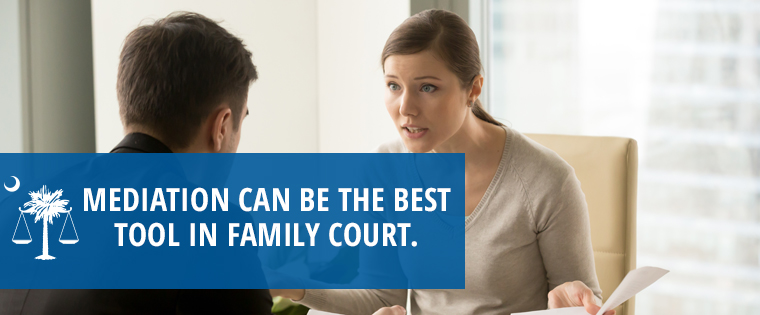Whenever I meet with a prospective client to discuss a Greenville Family Court matter, I chart out a map of how his or her case may work its way through the Family Court system in South Carolina. One possible destination on that map is mediation.
What is mediation?
Mediation is a process by which both parties come together and try to come up with an agreement. Usually, before mediation ever occurs, I will make overtures to the other party’s attorney to see if the case can be settled without mediation, and that occurs on some occasions. But the reality is that it is much easier to come to an agreement and to discuss the case when both parties and both attorneys (and sometimes the Guardian ad Litem) are all under one roof.
When you attend mediation, you and your attorney will be in one room and the other party and their attorney will be in another room. The mediation is conducted by, or led by, a certified mediator. The mediator’s job is to try and help the parties come to an agreement in the case. Usually, the mediator meets with the plaintiff first and takes the plaintiff’s initial settlement offer to the defendant. The mediator then goes back and forth between both parties trying to work out an agreement.
When do I have to attend mediation?
Mediation is usually conducted after the parties have attended a Temporary Hearing and always before a contested Final Hearing. On occasion, I will suggest to a client that we try and attend mediation before a Temporary Hearing. I only suggest mediation very early in the process if I believe the parties are already close to agreeing on all issues.
I prefer to attend mediation after the parties have engaged in discovery, so my client has as much information as possible during the negotiating process and is making an informed decision. But finances also play a role. Engaging in discovery is time-consuming and therefore expensive, so sometimes a client will elect to try and reach an agreement before he or she has to spend the money to engage in discovery.
Why do I have to attend mediation?
The easy answer is that in most South Carolina counties, mediation is required by the Court before the parties can even request a contested Final Hearing.
Most cases in the Family Court are extremely emotionally charged, whether it is an end of a marriage or a fight for custody of a child. And I have many clients who are in the middle of this emotionally charged case and do not want to attend mediation because he or she believes it is a waste of time—a waste of time that he or she has to pay for. And yes, the parties have to split the cost of the mediation (the cost varies depending on the mediator used). So the easy answer is that you have to attend mediation because the Court says so.
But, my other answer to why we have to go to mediation is that it is important for my client to try their very hardest to work out an agreement. If an agreement is reached in mediation, my client has participated in that agreement. My client has a say in the custody arrangement, visitation schedule, alimony, or the property division; whatever the issues are, the client has a say in how those issues are resolved. And in the end, it is the client who has to live with the agreement, and it is the client who knows the most about the issues. The alternative is to have a judge hear the case for one day, two days, or however long the trial lasts, and make a decision without the client having any say in the ultimate outcome.
Some case are trials; in some cases, no agreement can be reached. But it is always in the client’s best interest to put in a good-faith effort to resolving the case through an agreement. Mediation is often the tool to reach that agreement.
Contact John today if you would like to discuss your Family Court situation.





